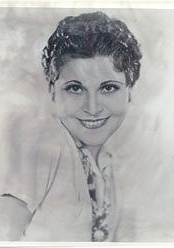به ازای هر نفری که با دعوت شما در منظوم ثبتنام میکنند 20 امتیاز میگیرید.
لینک دعوت:


The full-faced, raven-haired California-born actress was christened Lena Baskette, the daughter of Frank Baskette, a drug store owner. Lina trained in dance while very young and at the San Francisco World's Fair of 1915, the eight-year-old was featured as a baby ballerina for the Victor Talking Machine Company's exhibition. Movie maker Carl Laemmle saw her perform and signed her to a long-term contract with his Universal Pictures company at $50 a week. Lina headlined her very own short programs, the "Lena Baskette Featurettes," between 1916-1917, and also garnered young leads in a number of full-length features including What Love Can Do (1916), Shoes (1916), A Prince for a Day (1917), The Weaker Vessel (1919) and, more notably, Penrod (1922).
In 1916, Lena's father died and mother Gladys remarried. Gladys and her new husband, dance director Ernest Belcher, had a daughter together who became Lena's half-sister and future dancing star Marge Champion. Lena's mother was an avid stage mother and eventually, with Belcher's help, managed to prod Lena into the Ziegfeld Follies of 1923. She stayed with the Follies for a couple of years. Billed third as "America's Prima Ballerina," Lena's marquee name was changed to the more exotic spelling of "Lina Basquette." Her act was caught by the legendary Russian ballerina Anna Pavlova, who offered to take on Lina as her protégée. Lina's mother nixed the offer, wishing to make bigger bucks for her daughter with the Follies and other shows, Texas Guinan's notorious speakeasies notwithstanding.
At age 18, Lina married 38-year-old Warner Bros. mogul Sam Warner. Lina greatly influenced Warner to pursue sound pictures and even encouraged him to star Al Jolson in The Jazz Singer (1927). Sam died unexpectedly at age 40 of a brain hemorrhage the night before the film's premiere. This heartbreak jump-started an avalanche of problems for Lina. She not only became embroiled in a series of legal battles with her in-laws over her husband's estate, she lost custody of her daughter Lita in the process. She would not see her daughter for another 30 years. This crisis led to Lina's first attempt at suicide.
Lina valiantly returned to films and made such silents as Ranger of the North (1927), The Noose (1928) and Wheel of Chance (1928), while scoring two noteworthy roles in Frank Capra's The Younger Generation (1929) and Cecil B. DeMille's The Godless Girl (1929). In the latter she played an avowed atheist. This powerful film should have made Lina a sultry star had it not been released as a silent film right at the advent of talkies.
Within a very short time Lina married twice more -- a quickie union to cameraman J. Peverell Marley, and in 1931 the widow (once again) of third husband, actor Ray Hallam, who suddenly died at the age of 26 after only a few months of wedded bliss. Lina subsequently started up a highly publicized affair with famed boxer Jack Dempsey. Their stormy breakup led to her second suicide try and a rebound marriage to his personal trainer Theodore Hayes in December of 1931. This fourth marriage was not valid as it was discovered that Hayes was already married. The couple remarried in 1933 and had a son, Edward Alvin, in 1934 before divorcing the following year.
At this juncture Lina's private life received more interest from the public than her films. Her career had down-sized to "B" westerns opposite such stars as Buck Jones and Hoot Gibson and a few mellers here and there. After touring the stages of Australia, New Zealand and various South African cities in the plays "Private Lives," "Black Limelight" and "Idiot's Delight" in 1938 and 1939, and after appearing in the films Rose of the Rio Grande (1938), Four Men and a Prayer (1938) and A Night for Crime (1943), she called it quits.
Misfortune, however, continued to follow her. In August of 1943 she brought up assault and rape charges against a 22-year-old Army GI. The soldier was found guilty and sentenced to 20 years in the brig. Completely retired, she found emotional solace with her new post-war profession -- the breeding and handling of Great Danes. In 1949, she became the owner of Honey Hollow Kennels, a 25 acre estate in Bucks County, Pennsylvania. There she bred and raised champion dogs for best-in-shows and also became a respected judge. More marriages came and fell by the wasteside and at least one of her later unions lost out to an either/or ultimatum with her Great Danes. Lina also wrote the non-fiction book "Your Great Dane" in 1972. She moved to Wheeling, West Virginia, in 1975 and lived there until her death of lymphoma at age 87 on September 30, 1994.
Out of nowhere, the octogenarian grandmother had one last chance to bask in the limelight when she was touchingly cast as Nada in Daniel Boyd's independent feature Paradise Park (1991) playing an Appalachian trailer park granny who dreams that God is coming and granting a wish on all its residents. The film also featured country music stars Porter Wagoner and Johnny PayCheck. Boyd had met the actress at a West Virginia film festival.